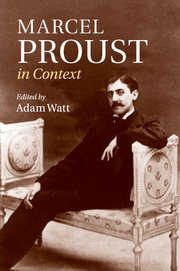Book contents
- Frontmatter
- Contents
- List of Illustrations
- Notes on contributors
- Figure I. Marcel Proust, portrait in oils by Jacques-Émile Blanche, 1892
- Preface
- Figure 2. Proust photographed on his death-bed by Man Ray, 1922
- Note on the text
- Chronology
- Part I Life and works
- Part II Historical and cultural contexts
- Part III Critical reception
- Chapter 24 Critical reception during Proust's lifetime
- Chapter 25 Early critical responses, 1922 to 1950s
- Chapter 26 Mid-twentieth-century views, 1960s to 1980s
- Chapter 27 Late-twentieth- and twenty-first-century responses
- Chapter 28 Modernism
- Chapter 29 Adaptations/afterlives
- Chapter 30 Translations
- Further reading
- Index
- References
Chapter 26 - Mid-twentieth-century views, 1960s to 1980s
from Part III - Critical reception
Published online by Cambridge University Press: 05 November 2013
- Frontmatter
- Contents
- List of Illustrations
- Notes on contributors
- Figure I. Marcel Proust, portrait in oils by Jacques-Émile Blanche, 1892
- Preface
- Figure 2. Proust photographed on his death-bed by Man Ray, 1922
- Note on the text
- Chronology
- Part I Life and works
- Part II Historical and cultural contexts
- Part III Critical reception
- Chapter 24 Critical reception during Proust's lifetime
- Chapter 25 Early critical responses, 1922 to 1950s
- Chapter 26 Mid-twentieth-century views, 1960s to 1980s
- Chapter 27 Late-twentieth- and twenty-first-century responses
- Chapter 28 Modernism
- Chapter 29 Adaptations/afterlives
- Chapter 30 Translations
- Further reading
- Index
- References
Summary
Proust's À la recherche du temps perdu is a privileged object in the fields of philosophy and literary theory, as well as in rather less easily identifiable critical spaces in which literary criticism, political theory, psychoanalysis and visual theory overlap. Proust functions in multifarious ways across and between disciplines, including critical theory, deconstruction, feminism, hermeneutics, Marxism, narratology, structuralism, post-Marxism and post-structuralism. Among prominent philosophers, theorists and literary critics of the 1960s and 1970s, Roland Barthes, Leo Bersani, Maurice Blanchot, Gilles Deleuze, Serge Doubrovsky, Gérard Genette, René Girard, Félix Guattari, Julia Kristeva, Emmanuel Lévinas, Georges Poulet and Jean-Pierre Richard (to name only some of the most influential) have all written at length about Proust. Their understanding of Proust varies widely, but for all of them something more than straightforward exemplarity is at stake: Proust's name is not simply one among others.
It is beyond the scope of this essay to explore each significant engagement with À la recherche across two decades of radically shifting critical landscapes. Instead, I shall try to identify some non-totalizing affinities – what Gilles Deleuze, following Proust, calls ‘transversals’ – between a selection of readings of Proust's work from this period that have endured. Each of these readings provides a different response to the question posed by Deleuze at the very beginning of his Proust and Signs, first published in 1964: ‘In what does the unity of À la recherche du temps perdu consist?’
- Type
- Chapter
- Information
- Marcel Proust in Context , pp. 199 - 205Publisher: Cambridge University PressPrint publication year: 2013



